Attached files
| file | filename |
|---|---|
| EX-99.1 - EX-99.1 - SYNNEX CORP | d629064dex991.htm |
| 8-K - FORM 8-K - SYNNEX CORP | d629064d8k.htm |
Exhibit 99.2

AFTAB PUREVAL
HAMILTON COUNTY CLERK OF COURTS
COMMON PLEAS DIVISION
ELECTRONICALLY FILED
September 10, 2018 03:22 PM
AFTAB PUREVAL
Clerk of Courts
Hamilton County, Ohio
CONFIRMATION 775999
| JOEL ZALVIN vs. ANDREA J AYERS |
A 1804888 |
FILING TYPE: INITIAL FILING (OUT OF COUNTY) WITH JURY
DEMAND
PAGES FILED: 38
EFR200
E-FILED 09/10/2018 03:22 PM / CONFIRMATION 775999 / A 1804888 / COMMON PLEAS DIVISION / IFOJ
IN THE COURT OF COMMON PLEAS
HAMILTON COUNTY, OHIO
GENERAL DIVISION
| Joel Zalvin, And All Others Similarly Situated c/o The Brualdi Law Firm, P.C. 29 Broadway, Suite 2400 New York, New York 10006, |
) ) ) ) ) ) |
|||
| Plaintiff, |
) | CASE NO. | ||
| ) | ||||
| v. | ) | (JUDGE ) | ||
| ) | ||||
| Andrea J. Ayers | ) | |||
| 201 East Fourth Street | ) | |||
| Cincinnati, Ohio 45202 | ) | CLASS ACTION COMPLAINT | ||
| ) | ||||
| and | ) | JURY TRIAL DEMAND | ||
| ) | ENDORSED HEREON | |||
| Cheryl K. Beebe | ) | |||
| 201 East Fourth Street | ) | |||
| Cincinnati, Ohio 45202 | ) | |||
| ) | ||||
| and | ) | |||
| Richard R. Devenuti | ) ) |
|||
| 201 East Fourth Street | ) | |||
| Cincinnati, Ohio 45202 | ) | |||
| ) | ||||
| and | ) | |||
| Jeffrey H. Fox | ) ) |
|||
| 201 East Fourth Street | ) | |||
| Cincinnati, Ohio 45202 | ) | |||
| ) | ||||
| and | ) | |||
| (Caption continued on following page) | ) ) ) ) |
|||
| ) | ||||
| ) |
1
E-FILED 09/10/2018 03:22 PM / CONFIRMATION 775999 / A 1804888 / COMMON PLEAS DIVISION / IFOJ
| Joseph E. Gibbs | ) | |||
| 201 East Fourth Street | ) | |||
| Cincinnati, Ohio 45202 | ) | |||
| ) | ||||
| and | ) | |||
| Joan E. Herman | ) ) |
|||
| 201 East Fourth Street | ) | |||
| Cincinnati, Ohio 45202 | ) | |||
| ) | ||||
| and | ) | |||
| Robert E. Knowling, Jr. | ) ) |
|||
| 201 East Fourth Street | ) | |||
| Cincinnati, Ohio 45202 | ) | |||
| ) | ||||
| and | ) | |||
| ) | ||||
| Thomas L. Monahan III | ) | |||
| 201 East Fourth Street | ) | |||
| Cincinnati, Ohio 45202 | ) | |||
| and | ) ) |
|||
| Ronald L. Nelson | ) ) |
|||
| 201 East Fourth Street | ) | |||
| Cincinnati, Ohio 45202 | ) | |||
| ) | ||||
| and | ) | |||
| ) | ||||
| Convergys Corp. | ) | |||
| 201 East Fourth Street | ) | |||
| Cincinnati, Ohio 45202, | ) | |||
| Defendants. |
) ) |
CLASS ACTION COMPLAINT
Plaintiff, as and for his Class Action Complaint, alleges upon personal knowledge as to himself and his own acts, and upon information and belief derived from, inter alia, a review of documents filed with the Securities and Exchange Commission (“SEC”), press releases issued by the
2
E-FILED 09/10/2018 03:22 PM / CONFIRMATION 775999 / A 1804888 / COMMON PLEAS DIVISION / IFOJ
Defendants, and publicly available news sources, such as articles in the financial press, as to all other matters, as follows:
NATURE OF THE ACTION
1. This is a shareholder class action (the “Action”) brought on behalf of Plaintiff and the other public stockholders of Convergys Corp. (“Convergys” or the “Company”) common stock against Convergys and the members of its board of directors (the “Individual Defendants” or “Board”).
2. The Action challenges the Board’s actions in causing Convergys, one of Cincinnati’s largest companies, to enter into an agreement (the “Sale Agreement”) to be sold to SYNNEX Corporation (“SYNNEX”) (the “Sale”). The Sale comes at an inopportune time for the Company as, according to at least one analyst, the Company is still in the process of building itself up to a good negotiating position, and was prompted by the desire of Convergys’ directors to appease New York based hedge fund and activist shareholder, Elliott Management Corporation (“Elliott Management”), which, as alleged in detail at paragraph 34, has been described by Fortune Magazine as having a feared reputation of causing companies to sell themselves by using methods which some have deemed as “cross[ing] ethical boundaries.” Eager to escape the consequences of Elliott Management’s wrath, the Individual Defendants caused Convergys to enter into the Sale Agreement.
3. The Sale is anticipated to have a negative impact on Cincinnati’s local economy as noted by a WCPO Cincinnati news article as follows:
If the deal goes through as planned, Convergys would be the third-largest of a dozen publicly traded companies to be sold or relocate its headquarters away from Cincinnati since 2014. About a thousand local jobs would be more vulnerable to downsizing, as Synnex is planning to trim $150 million from the combined annual budgets of both companies.
3
E-FILED 09/10/2018 03:22 PM / CONFIRMATION 775999 / A 1804888 / COMMON PLEAS DIVISION / IFOJ
The sale could also have subtle impacts on the local economy. Since its 1999 spinoff from Cincinnati Bell Inc., Convergys has been an important contributor to local charities and served as a regional talent feeder. Its former executives have claimed high-ranking positions at the Cincinnati USA Regional Chamber, Cincinnati Children’s Hospital Medical Center and WCPO’s parent company, E.W. Scripps Co.
Dan Monk, Analyst: Convergys Corp. May Be Selling at the Wrong Time, WCPO Cincinnati (September 6, 2018), https://www.wcpo.com/news/insider/analyst-convergys-corp-may-be-selling-at-the-wrong-time (emphasis added), copy attached as Exhibit A.
4. Additionally, the Sale is also to the detriment of Plaintiff and Convergys’ public shareholders. In this regard, in order to appease Elliott Management, the Individual Defendants caused Convergys to engage in a rushed and haphazard sale process in which the price being paid to Convergys shareholders was decreased from as high as $29.50 per share to $26.50 per share at the time of the signing of the Sale Agreement. Further, financial analyses conducted by Convergys’ own financial advisor, Centerview Partners, LLC (“Centerview”) attributed a value as high as $30.25 per share for Convergys.1 Thus, shareholders are being deprived by as much as $340 million in value.
5. Plaintiff further alleges that Defendants caused Convergys to conceal material information from Plaintiff and Convergys’ other public shareholders in the proxy statement that Convergys’ directors caused the Company to file with the SEC and mail to shareholders in connection with soliciting votes in support of the Sale of the company, including information regarding: (a) the conflicts of interest of Convergys’ directors, including the amount of cash payments each will receive for his or her unvested award of restricted stock units (“RSUs”) and
| 1 | Pursuant to the Sale Agreement, Convergys’ shareholders will receive $13.25 per share in cash and 0.1193 shares of SYNNEX common stock for each Convergys share they own. At the time the Sale Agreement was entered, a reference range of $111.08 was used for SYNNEX stock, at which price Convergys’ shareholders would receive an implied price of $26.50 per share. However, following the June 28, 2018 announcement of the Sale Agreement, SYNNEX’s stock has stumbled and now regularly trades below $95.00 per share. |
4
E-FILED 09/10/2018 03:22 PM / CONFIRMATION 775999 / A 1804888 / COMMON PLEAS DIVISION / IFOJ
performance-based restricted stock units (“PSUs”), (b) the conflicts of interest of Convergys’ financial advisor, Centerview, (c) certain financial projections used by Centerview in creating its fairness opinion (that the price being paid to Convergys’ shareholders pursuant to the Sale Agreement is fair) – which fairness opinion the Individual Defendants relied upon in recommending that shareholders vote in favor of the Sale Agreement, and (d) the sale process leading to the Sale Agreement.
JURISDICTION AND VENUE
6. This Court has jurisdiction over this Action because Convergys is an Ohio corporation which maintains its corporate headquarters at 201 East Fourth Street, Cincinnati, Ohio 45202 and because the improper conduct related to Defendants’ unlawful efforts occurred in and/or was directed at this State. Additionally, this Court has jurisdiction over each of the Defendants because they conduct business in, reside in, and/or their wrongful conduct challenged in this Complaint was directed at, and intended to have its primary effect in, Ohio.
7. Venue is proper in this Court pursuant to Ohio Rule of Civil Procedure 3(C) because Convergys’ principal place of business is located in this county, and Defendants’ wrongful activities which gave rise to Plaintiff’s claim for relief were principally performed in or directed at this county.
8. This Action challenges the internal affairs or governance of Convergys and hence is not removable to Federal Court under the Class Action Fairness Act of 2005 or the Securities Litigation Uniform Standards Act (“SLUSA”), 15 U.S.C. § 78bb(f).
PARTIES
9. Plaintiff Joel Zalvin is the owner of shares of Convergys’ common stock and has continuously owned such shares since on or about May 27, 2016.
5
E-FILED 09/10/2018 03:22 PM / CONFIRMATION 775999 / A 1804888 / COMMON PLEAS DIVISION / IFOJ
10. Defendant Convergys is a publicly traded Ohio corporation which maintains its principal executive offices at 201 East Fourth Street, Cincinnati, Ohio 45202. Convergys provides outsourcing services to its customers and is the second-largest global provider in its industry. Convergys’ common stock is traded on the New York Stock Exchange under the symbol “CVG.” This Court has jurisdiction over Convergys because it is incorporated and headquartered in Ohio.
11. Defendant Andrea J. Ayers (“CEO Ayers”) has been employed at Convergys for more than 30-years, and currently serves as the Company’s President, CEO, and as a director. In connection with the Sale Agreement, CEO Ayers will receive a cash payout of $14.8 million, over $10 million of which is for the accelerated vesting of her unvested awards of restricted stock units (“RSUs”) and performance-based restricted stock units (“PSUs”). In addition, she will be granted a right to indemnification for acts or omissions occurring prior to the consummation of the Sale Agreement. This Court has jurisdiction over CEO Ayers because she is a resident of Ohio, Convergys is incorporated and headquartered in Ohio, and many of CEO Ayers’ actions challenged in this Complaint occurred in, or were directed at, this State.
12. Defendant Cheryl K. Beebe (“Ms. Beebe”) has served as a director of Convergys since January, 2015. In connection with the Sale Agreement, Ms. Beebe will receive a cash payment of an undisclosed amount for the accelerated vesting of her unvested RSUs and PSUs. In addition, she will be granted a right to indemnification for acts or omissions occurring prior to the consummation of the Sale Agreement. This Court has jurisdiction over Ms. Beebe because Convergys is incorporated and headquartered in Ohio, and many of Ms. Beebe’s actions challenged in this Complaint occurred in, or were directed at, this State.
6
E-FILED 09/10/2018 03:22 PM / CONFIRMATION 775999 / A 1804888 / COMMON PLEAS DIVISION / IFOJ
13. Defendant Richard R. Devenuti (“Mr. Devenuti”) has served as a director of Convergys since August, 2009. In connection with the Sale Agreement, Mr. Devenuti will receive a cash payment of an undisclosed amount for the accelerated vesting of his unvested RSUs and PSUs. In addition, he will be granted a right to indemnification for acts or omissions occurring prior to the consummation of the Sale Agreement. This Court has jurisdiction over Mr. Devenuti because Convergys is incorporated and headquartered in Ohio, and many of Mr. Devenuti’s actions challenged in this Complaint occurred in, or were directed at, this State.
14. Defendant Jeffrey H. Fox (“Mr. Fox” or “Chairman Fox”)) has served as a director of Convergys since February, 2009 and as Chairman of the Company’s Board at all relevant times. In connection with the Sale Agreement, Mr. Fox will receive a cash payment of an undisclosed amount for the accelerated vesting of his unvested RSUs and PSUs. In addition, he will be granted a right to indemnification for acts or omissions occurring prior to the consummation of the Sale Agreement. This Court has jurisdiction over Mr. Fox because Convergys is incorporated and headquartered in Ohio, and many of Mr. Fox’s actions challenged in this Complaint occurred in, or were directed at, this State.
15. Defendant Joseph E. Gibbs (“Mr. Gibbs”) has served as a director of Convergys since December, 2000. In connection with the Sale Agreement, Mr. Gibbs will receive a cash payment of an undisclosed amount for the accelerated vesting of his unvested RSUs and PSUs. In addition, he will be granted a right to indemnification for acts or omissions occurring prior to the consummation of the Sale Agreement. This Court has jurisdiction over Mr. Gibbs because Convergys is incorporated and headquartered in Ohio, and many of Mr. Gibbs actions challenged in this Complaint occurred in, or were directed at, this State.
7
E-FILED 09/10/2018 03:22 PM / CONFIRMATION 775999 / A 1804888 / COMMON PLEAS DIVISION / IFOJ
16. Defendant Joan E. Hermann (“Ms. Hermann”) has served as a director of Convergys since December, 2011. In connection with the Sale Agreement, Ms. Hermann will receive a cash payment of an undisclosed amount for the accelerated vesting of her unvested RSUs and PSUs. In addition, she will be granted a right to indemnification for acts or omissions occurring prior to the consummation of the Sale Agreement. This Court has jurisdiction over Ms. Hermann because Convergys is incorporated and headquartered in Ohio, and many of Ms. Hermann’s actions challenged in this Complaint occurred in, or were directed at, this State.
17. Defendant Robert E. Knowling, Jr. (“Mr. Knowling”) has served as a director of Convergys since September, 2017. In connection with the Sale Agreement, Mr. Knowling will receive a cash payment of an undisclosed amount for the accelerated vesting of his unvested RSUs and PSUs. In addition, he will be granted a right to indemnification for acts or omissions occurring prior to the consummation of the Sale Agreement. This Court has jurisdiction over Mr. Knowling because Convergys is incorporated and headquartered in Ohio, and many of Mr. Knowling’s actions challenged in this Complaint occurred in, or were directed at, this State.
18. Defendant Thomas L. Monahan, III (“Mr. Monahan”) has served as a director of Convergys since February, 2008. In connection with the Sale Agreement, Mr. Monahan will receive a cash payment of an undisclosed amount for the accelerated vesting of his unvested RSUs and PSUs. In addition, he will be granted a right to indemnification for acts or omissions occurring prior to the consummation of the Sale Agreement. This Court has jurisdiction over Mr. Knowling because Convergys is incorporated and headquartered in Ohio, and many of Mr. Knowling’s actions challenged in this Complaint occurred in, or were directed at, this State.
8
E-FILED 09/10/2018 03:22 PM / CONFIRMATION 775999 / A 1804888 / COMMON PLEAS DIVISION / IFOJ
19. Defendant Ronald L. Nelson (“Mr. Nelson”) has served as a director of Convergys since August, 2008. In connection with the Sale Agreement, Mr. Nelson will receive a cash payment of an undisclosed amount for the accelerated vesting of his unvested RSUs and PSUs. In addition, he will be granted a right to indemnification for acts or omissions occurring prior to the consummation of the Sale Agreement. This Court has jurisdiction over Mr. Nelson because Convergys is incorporated and headquartered in Ohio, and many of Mr. Nelson’s actions challenged in this Complaint occurred in, or were directed at, this State.
20. Each defendant herein is sued individually and/or as an aider and abettor. The Individual Defendants are also sued in their capacity as directors of Convergys. The liability of each Defendant arises from the fact that he or she engaged in all or part of the unlawful acts, plans, schemes, or transactions complained of herein.
THE INDIVIDUAL DEFENDANTS’ FIDUCIARY DUTIES
21. Under applicable common law and under ORC 1701.59, the directors of a publicly held company such as Convergys have fiduciary duties of care, good faith, loyalty and disclosure, and are liable to shareholders for breaches thereof. They are required to discharge such duties as directors in good faith and subordinate their own selfish interests to those of the corporation where their interests conflict. Where it appears that a director has obtained any personal profit from dealing with the corporation, and the transaction is drawn into question as between him and the stockholders of the corporation, the burden is upon the director or officer to show that the transaction has been fair, open and in the utmost good faith.
22. As alleged in detail below, the Individual Defendants have breached, and/or aided other Defendants’ breaches of, their fiduciary duties to Convergys’ public shareholders by acting to cause or facilitate the Sale Agreement which benefits each of Convergys’ directors but is to the detriment of Plaintiff and Convergys’ other public shareholders.
9
E-FILED 09/10/2018 03:22 PM / CONFIRMATION 775999 / A 1804888 / COMMON PLEAS DIVISION / IFOJ
23. Because the Individual Defendants have knowingly or recklessly breached their fiduciary duties in connection with the Sale Agreement, and/or are personally profiting from the same, the burden of proving the inherent or entire fairness of the Sale Agreement, including all aspects of its negotiation, structure, and terms, is borne by Defendants as a matter of law.
24. Further, as alleged in detail infra, the Individual Defendants have breached their fiduciary duty of disclosure under state law in that the Individual Defendants caused the Proxy Statement to be filed with the SEC and mailed to Plaintiff and the other public shareholders of Convergys in connection with soliciting their vote on the Sale Agreement, but concealed therein certain material information which a reasonable shareholder would find material in determining how to vote with regard to the Sale Agreement. Among other things, the Individual Defendants have failed to disclose material information regarding: (a) the conflicts of interest of Convergys’ directors, including the amount of cash payments each will receive for his or her unvested RSUs and PSUs, (b) the conflicts of interest of Convergys’ financial advisor, Centerview, (c) certain financial projections used by Centerview in creating its fairness opinion, and (d) the sale process.
CLASS ACTION ALLEGATIONS
25. Plaintiff brings this action as a class action pursuant to Ohio Rule of Civil Procedure 23 on behalf of himself and all other public shareholders of the Company (the “Class”). Excluded from the Class are (i) the Defendants herein and their Related Persons (as defined by SEC rules), (ii) holders of 5% or more, in the aggregate, of Convergys’ stock and their Related Persons (as defined by SEC rules), (iii) Elliott Management and its Related Persons (as defined by SEC rules), and (iv) Sean Griffith and any shareholder who purchased his, her or its shares solely for the purpose of objecting to any potential settlement of this action.
10
E-FILED 09/10/2018 03:22 PM / CONFIRMATION 775999 / A 1804888 / COMMON PLEAS DIVISION / IFOJ
26. The members of the Class are so numerous that separate joinder of each member is impracticable. While the exact number of Class members is unknown to plaintiff, and can be ascertained only through appropriate discovery, plaintiff believes there are many thousands, if not hundreds of thousands, of Class members. As of August 23, 2018, Convergys had approximately 91 million shares of common stock outstanding.
27. Plaintiff’s claims raise questions of law or fact common to the questions of law or fact raised by the claims of each member of the Class. The predominant questions of law and fact include, among others, whether:
(a) the Defendants have and are breaching their fiduciary duties to the detriment of Convergys’ shareholders;
(b) Plaintiff and the Class are entitled to an injunction and other equitable relief; and
(c) Plaintiff and the Class have been damaged and the extent to which they have sustained damages, and what is the proper measure of those damages.
28. Plaintiff’s claims are typical of the claims of each member of the Class.
29. Plaintiff will fairly and adequately protect the interests of each member of the Class. Plaintiff is committed to the vigorous prosecution of this action and has retained counsel competent and experienced in this type of litigation.
30. A class action is superior to other available methods of adjudication in promoting the convenient administration of justice because the prosecution of separate claims or defenses by individual members of the Class would create the risk of inconsistent or varying adjudications with respect to individual class members that would establish incompatible standards of conduct for the
11
E-FILED 09/10/2018 03:22 PM / CONFIRMATION 775999 / A 1804888 / COMMON PLEAS DIVISION / IFOJ
party opposing the class, or adjudications concerning individual members of the Class that, as a practical matter, would be dispositive of the interests of the other members of the Class who are not parties to the adjudications or would substantially impair or impede their ability to protect their interests. Given the nature of the claims, final equitable or declaratory relief will likely be appropriate with respect to the class. The action will be easily manageable as a class action. Further, in view of the complexity of the issues or the expense of litigation the separate claims of individual class members are insufficient in amount to support separate actions. In addition, it is probable that the amount which may be recovered by individual class members will not be large enough in relation to the expense and effort of administering the action to justify an individual action. Members of the class do not have a significant interest in controlling the prosecution or defense of separate actions.
SUBSTANTIVE ALLEGATIONS
31. On June 28, 2018, Convergys announced that it had entered into the Sale Agreement to be acquired by SYNNEX. Pursuant to the Sale Agreement, Convergys’ shareholders will receive $13.25 per share in cash and 0.1193 shares of SYNNEX common stock for each Convergys share they own. At the time the Sale Agreement was entered, a reference range of $111.08 was used for SYNNEX stock, at which price Convergys’ shareholders would have received an implied price of $26.50 per share.2 However, following the June 28,2018 announcement of the Sale Agreement, at a time that the stock market as a whole is in a robust position, SYNNEX’s stock price has plummeted and now regularly trades below $95.00 per share.
| 2 | This price was also repeatedly negotiated down from as high as $29.50 per share and is currently significantly less than the $30.25 per share price implied by Centerview’s discounted cash flow analysis. In this regard, courts have found that the discounted cash flow analysis is “arguably the most important valuation metric” (see Laborers Local 235 Benefit Funds v. Starent Networks, Corp., 2009 Del. Ch. LEXIS 210, at *2 (November 18, 2009)) and “the most reliable and pertinent” valuation analysis (see Global GTLP v. Golden Telecom, Inc., 993 A.2d 497, 510 & n.10 (Del. Ch. 2010)). |
12
E-FILED 09/10/2018 03:22 PM / CONFIRMATION 775999 / A 1804888 / COMMON PLEAS DIVISION / IFOJ
32. The Sale Agreement was the product of a haphazard and rushed process in which Convergys’ Board seriously negotiated with only five potential buyers and made no efforts to seek out potential buyers which would have had a greater likelihood of minimizing the effects of a sale on the Cincinnati economy. Indeed, as alleged in paragraph 3, the Sale could potentially have a negative impact Cincinnati’s local economy.
33. The decision to sell the Company also comes at an inopportune time. In this regard, as a result of a multi-year decline in revenue and certain strategic decisions which made the Company too reliant on telecom clients, Convergys was in a poor negotiating position. However, at least one analyst, Vince Colichio of Barrington Research, believes that Convergys might have been in a better negotiating position had it waited until its revenue was restored before it sought to sell itself.
34. The decision to enter into the Sale Agreement was driven by Convergys’ directors desire to appease activist investor and New York based hedge fund, Elliott Management. In this regard, the Board began exploring a sale of the Company after it was contacted and informed by a representative of Elliott Management that it had acquired a 4.9% ownership stake in the Company. Elliott Management is no ordinary hedge fund. It has a feared reputation as an activist hedge fund which pushes companies to sell themselves using methods which some have deemed as “cross[ing] ethical boundaries” and has been accused by certain of its foes of using the children of people facing its attack in order to gain leverage. A December, 2017 article at Fortune.com describes Elliott Management thusly:
In the past five years, Elliott has launched activist campaigns at more than 50 companies—19 this year alone—in at least a dozen countries. During that span, . . . . the firm didn’t get what it wanted [in only one instance]—a sign of just how effective Elliott is at pressuring management to agree to its demands.
13
E-FILED 09/10/2018 03:22 PM / CONFIRMATION 775999 / A 1804888 / COMMON PLEAS DIVISION / IFOJ
* * * * *
And Elliott has lately sought to clone its winning strategy: It’s on track to launch about 50% more activist campaigns this year than in 2016—nearly three times as many as any other major activist fund—including, in October, two in a single day.
* * * * *
As Elliott ramps up its activism to an unprecedented scale, it is also accumulating a growing body count of deposed executives—not to mention ousted heads of state—who dared fight it.
* * * * *
In their conviction that they’re right, however, Elliott has become adept at wielding pressure on its opponents in ways their foes say can cross ethical boundaries. Through interviews with more than 40 people who have dealt with the hedge fund—including bankers, advisers, board members of various companies, and current and former employees of the firm—Fortune has learned previously unreported details that reveal just how far Elliott will go to win.
* * * * *
For [the CEO of an aerospace manufacturer], it started when a pair of people who identified themselves as private investigators showed up at the door of his next-door neighbor in New York’s Westchester County about a year ago, inquiring about “loud parties” at his house. As Elliott ramped up its pressure on Arconic [the Company led by the CEO], friends and colleagues of [the CEO], along with board members of Arconic, reported more suspicious run-ins: Others who live near the CEO were followed to a local restaurant by strangers who then approached the couple; they claimed to be considering investing with [the CEO], but first had a few questions. The German-born executive declined to speak with Fortune, but five people familiar with the events confirmed this account. They all believed Elliott to be behind it: “We thought they crossed the line,” one of the people says.
The most unnerving incident was when one of [the CEO’s] daughters, a student at Harvard Business School, was approached on campus by someone who asked to “friend” her on Facebook; the person also spoke to her friends, fishing for information about her family. While lawyers and advisers say it’s common to hire investigators to do opposition research in the context of a proxy campaign, executives’ kids—of any age—are typically considered off-limits.
Elliott does not seem to share those qualms: On at least three occasions, according to both court testimony and the accounts of seven people who spoke with Fortune, children of people facing the hedge fund’s attack have been pulled into the fray in
14
E-FILED 09/10/2018 03:22 PM / CONFIRMATION 775999 / A 1804888 / COMMON PLEAS DIVISION / IFOJ
some way, in an apparent bid to gain either information on or leverage against their parents. In an instance involving Norbert Essing, an Arconic PR consultant in Germany, neighbors of his children in London received visits from people asking about drug abuse by them or their father. This happened shortly after Elliott publicly blamed Essing for helping or encouraging [the CEO] to write his soccer ball letter. (Essing denies the accusation.)
Jan Wieczner, Inside Elliott Management: How Paul Singer’s Hedge Fund Always Wins, Fortune (December 7, 2017), http://fortune.com/2017/12/07/elliott-management-hedge-fund-paul-singer/ (emphasis added), copy attached as Exhibit B.
| C. | The Materially Misleading And/Or Incomplete Proxy Statement |
35. In addition, the Individual Defendants are breaching their fiduciary duty of full disclosure in connection with the Sale Agreement. In this regard, in connection with seeking shareholder votes on the Sale Agreement, the Individual Defendants have caused Convergys to file a proxy statement with the SEC and mail the same to Plaintiff and Convergys’ other shareholders. However, the Proxy Statement is deficient in that it misrepresents and/or omits, inter alia, material information as alleged below:
| (a) | According to the Proxy Statement, in connection with the Sale Agreement, each unvested Convergys restricted stock unit (“RSU”) award and performance-based restricted stock unit (“PSU”) held by a non-employee director will vest entitling such non-employee director to cash payments. The Proxy Statement is deficient because it fails to disclose the amount of cash payment that each non-employee director will receive for his or her unvested RSUs and PSUs. |
Information regarding the conflicts of interest of the Company’s director is material and must be disclosed.
| (b) | According to the Proxy Statement, in connection with rendering its fairness opinion and performing its related financial analyses, Centerview reviewed certain research analysts estimates relating to SYNNEX for 2018 and 2019 as extrapolated based on discussions with the management of SYNNEX and furnished to Centerview by Convergys for purposes of Centerview’s analysis (the “SYNNEX Public Forecasts”). The Proxy Statement is deficient because it fails to disclose (i) the SYNNEX Public Forecasts and (ii) Centerview’s rationale for utilizing the SYNNEX Public Forecasts in its fairness opinion instead of the forecasts prepared by SYNNEX’s management (the “SYNNEX Financial Projections”). |
15
E-FILED 09/10/2018 03:22 PM / CONFIRMATION 775999 / A 1804888 / COMMON PLEAS DIVISION / IFOJ
The SYNNEX Financial Projections are said to reflect the SYNNEX management’s “best estimates as to SYNNEX’ future performance” and SYNNEX management directed its financial advisor, BofA Merrill Lynch, to rely on the SYNNEX Financial Projections for its fairness opinion. In this regard, projections upon which a Company’s financial advisor relied in formulating its fairness opinion, which opinion is touted to shareholders, as well as the assumptions underlying such projections, must be disclosed so that Plaintiff and Convergys’ other public shareholders can assess for themselves the reasonableness of Centerview’s fairness opinion and determine how much weight to give to it.
| (c) | According to the Proxy Statement, in conducting the Selected Public Company Analysis underlying its fairness opinion, Centerview relied on Wall Street research analyst consensus estimates (the “Convergys Street Case Forecasts). The Proxy Statement is deficient because it fails to disclose the Convergys Street Case Forecasts. |
Projections upon which a Company’s financial advisor relied in formulating its fairness opinion, which opinion is touted to shareholders, as well as the assumptions underlying such projections, must be disclosed so that Plaintiff and Convergys’ other public shareholders can assess for themselves the reasonableness of Centerview’s fairness opinion and determine how much weight to give to it.
| (d) | According to the Proxy Statement, for the discounted cash flow analysis underlying its fairness opinion, Centerview utilized certain “unlevered free cash flow” projections for Convergys and SYNNEX. The Proxy Statement is deficient because it fails to disclose whether stock-based compensation was treated as a cash or non-cash expense in formulating the unlevered free cash flow projections. |
The assumptions underlying the projections used by a Company’s financial advisor in formulating its opinion that a transaction is fair must be disclosed so that Plaintiff and Convergys’ other public shareholders can assess for themselves the reasonableness of Centerview’s fairness opinion and determine how much weight to give to it.
| (e) | According to the Proxy Statement, certain (i) of Centerview’s and Centerview’s affiliates’ directors, officers, members and employees or family members of such persons, (ii) of Centerview’s affiliates or related investment funds and (iii) investment funds or other persons in which any of the foregoing may have financial interests or with which they may co-invest, may at any time acquire, hold, sell or trade in the debt, equity and other securities or financial instruments of SYNNEX. The Proxy Statement is deficient because it fails to disclose (i) the extent to which the Centerview employees involved in rendering the Fairness Opinion, or their superiors, are invested in SYNNEX and (ii) the value of Centerview’s investments in SYNNEX. |
16
E-FILED 09/10/2018 03:22 PM / CONFIRMATION 775999 / A 1804888 / COMMON PLEAS DIVISION / IFOJ
Information regarding the conflicts of interest of the Company’s financial advisor is material and must be disclosed.
| (f) | According to the Proxy Statement, an Elliott Management representative contacted Chairman Fox to inform him that Elliott Management had acquired a 4.9% ownership stake in Convergys and, at that time, shared Elliott Management’s initial perspectives on Convergys’ leadership, operations and financial performance. Convergys continued a dialogue with Elliott Management over the following months. The Proxy Statement is deficient because it fails to disclose (i) the substance of the perspective shared by the Elliott Management’s representative regarding Convergys’ leadership, operations and financial performance and (ii) the substance of what was discussed in the continued dialogue with Elliott Management over the following months. |
This information is material and must be disclosed so that Convergys’ shareholders can determine whether the Individual Defendants acted reasonably in negotiating the Sale Agreement.
| (g) | According to the Proxy Statement, on April 13, 2018 Elliott Management entered into a confidentiality and non-disclosure agreement, which provided for a limited standstill binding on Elliott Management. From that time through the executive of the Sale Agreement, Centerview periodically provided high level updates on the sale process to Elliott Management and were advised of Elliott Management’s views on the process. The Proxy Statement is deficient because it fails to disclose (i) the rationale for entering into a standstill agreement with Elliott Management and (ii) the substance of the views on the sale process provided by Elliott Management. |
This information is material and must be disclosed so that Convergys’ shareholders can determine whether the Individual Defendants acted reasonably in negotiating the Sale Agreement.
FIRST CAUSE OF ACTION
CLASS CLAIM FOR BREACH OF FIDUCIARY DUTIES OF GOOD FAITH, LOYALTY,
FAIR DEALING, AND DUE CARE
(Against the Individual Defendants)
36. Plaintiff repeats and realleges all previous allegations as if set forth in full herein.
17
E-FILED 09/10/2018 03:22 PM / CONFIRMATION 775999 / A 1804888 / COMMON PLEAS DIVISION / IFOJ
37. By reason of the foregoing, the Individual Defendants have breached their fiduciary duties of, inter alia, good faith, loyalty, fair dealing, and due care under Ohio law to Plaintiff and the Class and/or aided and abetted in the breach of those fiduciary duties.
38. As a result, Plaintiff and the Class have been and will be damaged.
SECOND CAUSE OF ACTION
CLASS CLAIM FOR FAILURE TO DISCLOSE
(Against all Defendants)
39. Plaintiff repeats and realleges all previous allegations as if set forth in full herein.
40. Under applicable law, the Individual Defendants have a fiduciary obligation to disclose all material facts in the Proxy Statement in order that Convergys’ shareholders make an informed decision as to whether to vote their shares pursuant to the Sale Agreement. As alleged in detail above, Individual Defendants have breached their fiduciary duty by making materially inadequate disclosures and material omissions in the Proxy Statement.
41. As a result of these failures to disclose, Plaintiff and the Class have been and will be damaged.
PRAYER
WHEREFORE, Plaintiff demands judgment as follows:
1. determining that this action is a proper class action and that Plaintiff is a proper class representative;
2. declaring that Defendants have breached their fiduciary duties to Plaintiff and the Class and/or aided and abetted such breaches;
18
E-FILED 09/10/2018 03:22 PM / CONFIRMATION 775999 / A 1804888 / COMMON PLEAS DIVISION / IFOJ
3. declaring that Defendants have breached their duty of full and fair disclosure to Plaintiff and the Class;
4. issuing a preliminary and permanent injunction until the disclosure deficiencies described herein are remedied;
5. awarding Plaintiff and the Class compensatory damages as allowed by law;
6. awarding interest, attorneys’ fees, expert fees, and other expenses and costs in an amount to be determined, to the extent allowable; and
7. granting such other relief as the Court may find just and proper.
| THE BRUALDI LAW FIRM, P.C. Richard B. Brualdi |
ALTICK & CORWIN CO., L.P.A. | |
| 29 Broadway, Suite 2400 | /s/ Steven E. Bacon | |
| New York, New York 10006 | Steven E. Bacon (#0059926) One South Main Street, Suite 1590 | |
| Of Counsel | Dayton, Ohio 45402 | |
| Telephone: (937) 223-1201 Facsimile: (937) 223-5100 bacons@altickcorwin.com Attorney for Plaintiff |
JURY DEMAND
Plaintiff herein demands a trial by jury on all claims and issues in this action.
| /s/ Steven E. Bacon |
| Steven E. Bacon (#0059926) |
| Attorney for Plaintiff |
19
E-FILED 09/10/2018 03:22 PM / CONFIRMATION 775999 / A 1804888 / COMMON PLEAS DIVISION / IFOJ
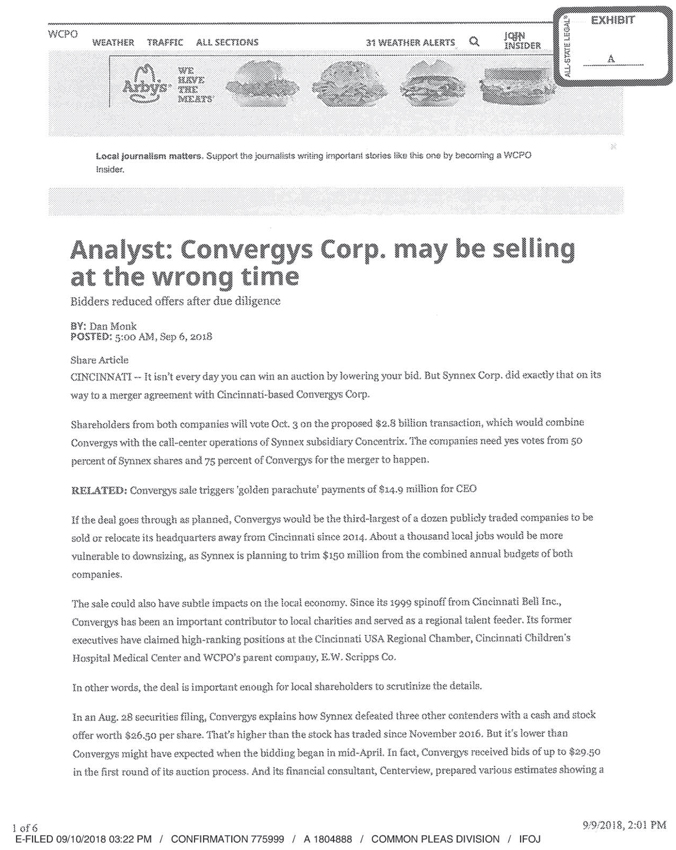
Analyst: Convergys Corp. may be selling at the wrong time
Bidders reduced offers after due diligence
BY: Dan Monk
POSTED: 5:00 AM, Sep 6, 2018
Share Article
CINCINNATI – It isn’t every day you can win an auction by lowering your bid. But Synnex Corp. did exactly that on its way to a merger agreement with Cincinnati-based
Convergys Corp.
Shareholders from both companies will vote Oct. 3 on the proposed $2.8 billion transaction, which would combine Convergys with the call-center
operations of Synnex subsidiary Concentrix. The companies need yes votes from 50 percent of Synnex shares and 75 percent of Convergys for the merger to happen.
RELATED: Convergys sale triggers ‘golden parachute’ payments of $14.9 million for CEO
If the deal goes through as planned, Convergys would be the third-largest of a dozen publicly traded companies to be sold or relocate its headquarters away from Cincinnati since
2014. About a thousand local jobs would be more vulnerable to downsizing, as Synnex is planning to trim $150 million from the combined annual budgets of both companies.
The sale could also have subtle impacts on the local economy. Since its 1999 spinoff from Cincinnati Bell Inc., Convergys has been an important contributor to local charities and
served as a regional talent feeder. Its former executives have claimed high-ranking positions at the Cincinnati USA Regional Chamber, Cincinnati Children’s Hospital Medical Center and WCPO’s parent company, E.W. Scripps Co.
In other words, the deal is important enough for local shareholders to scrutinize the details.
In an Aug. 28 securities filing, Convergys explains how Synnex defeated three other contenders with a cash and stock offer worth $26.50 per share. That’s
higher than the stock has traded since November 2016. But it’s lower than Convergys might have expected when the bidding began in mid-April. In fact, Convergys received bids of up to $29.50 in the first
round of its auction process. And its financial consultant, Centerview, prepared various estimates showing a price of up to $30.25 could be justified.
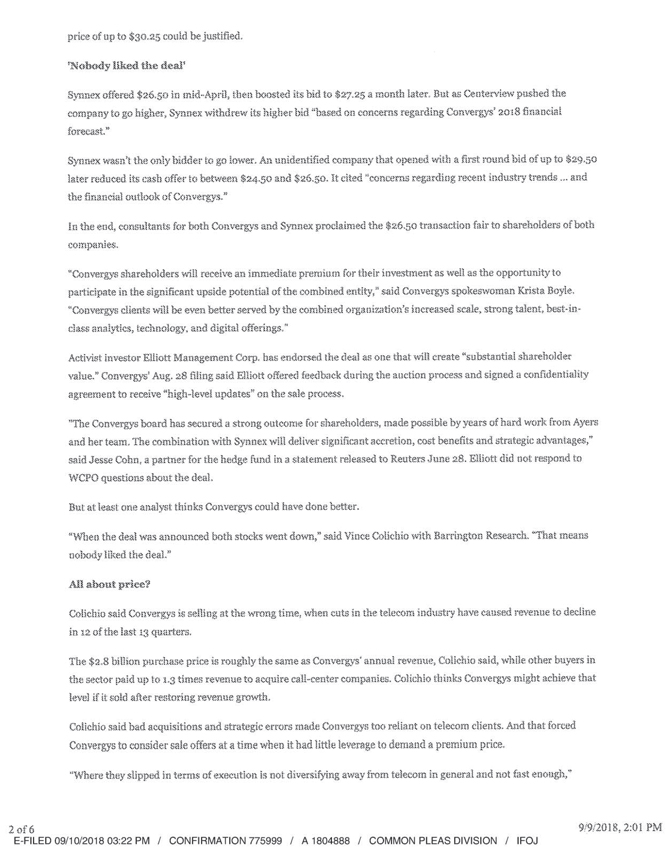
‘Nobody liked the deal’
Synnex offered
$26.50 in mid-April, then boosted its bid to $27.25 a month later. But as Centerview pushed the company to go higher, Synnex withdrew its higher bid “based on concerns regarding Convergys’ 2018
financial forecast.”
Synnex wasn’t the only bidder to go lower. An unidentified company that opened with a first round hid of up to $29.50 later reduced
its cash offer to between $24.50 and $26.50. It cited “concerns regarding recent industry trends... and the financial outlook of Convergys.”
In the end,
consultants for both Convergys and Synnex proclaimed the $26.50 transaction fair to shareholders of both companies.
“Convergys shareholders will receive an
immediate premium for their investment as well as the opportunity to participate in the significant upside potential of the combined entity,” said Convergys spokeswoman Krista Boyle. “Convergys clients will be even better served by the
combined organization’s increased scale, strong talent, best-in-class analytics, technology, and digital offerings.”
Activist investor Elliott Management Corp. has endorsed the deal as one that will create “substantial shareholder value.” Convergys’ Aug. 28 filing said Elliott
offered feedback during the auction process and signed a confidentiality agreement to receive “high-level updates” on the sale process.
“The
Convergys board has secured a strong outcome for shareholders, made possible by years of hard work from Ayers and her team. The combination with Synnex will deliver significant accretion, cost benefits and strategic advantages,” said Jesse
Cohn, a partner for the hedge fund in a statement released to Reuters June 28. Elliott did not respond to WCPO questions about the deal.
But at least one analyst
thinks Convergys could have done better.
“When the deal was announced both stocks went down,” said Vince Colichio with Barrington Research. “That
means nobody liked the deal.”
All about price?
Colichio said Convergys
is selling at the wrong time, when cuts in the telecom industry have caused revenue to decline in 12 of the last 13 quarters.
The $2.8 billion purchase price
is roughly the same as Convergys’ annual revenue, Colichio said, while other buyers in the sector paid up to 1.3 times revenue to acquire call-center companies. Colichio thinks Convergys might achieve that level if it sold after restoring
revenue growth.
Colichio said bad acquisitions and strategic errors made Convergys too reliant on telecom clients. And that forced Convergys to consider sale
offers at a time when it had little leverage to demand a premium price.
“Where they slipped in terms of execution is not diversifying away from telecom in
general and not fast enough,”

Colichio said. “You don’t want to be too highly exposed to anything in this business. It’s not a high-margin business.
You can really get in trouble.”
Revenue concentration isn’t a new problem for Convergys. For most of its 20-year
history as a public company, telecom providers generated the bulk of its revenue
AT&T, Time Warner, DirecTV and Sprint accounted for nearly half of Convergys
revenue in 2017. But it’s shrinking, thanks to mergers and competition. AT&T, which brought in 21.3 percent of Convergys revenue in 2015, provided only 13.6 percent of sales in its most recent quarter.
Synnex CEO Christopher Coldwell told analysts Convergys is well aware of the problem and is taking steps to correct it.
“The decline in customers is very, very targeted to the telco segmentation,” Coldwell told analysts in a June 28 conference call about the Convergys acquisition.
“The Convergys team has done very good job in sort of growing other business. They just haven’t been able to outrun some of the decline within the telecom sector.”
Convergys won new business worth more than $115 million in the first three months of this year by targeting technology and health-care
customers. And it invested nearly $1 billion in acquisitions since 2014, with revenue diversification in mind.
“It should also be noted that the
communications industry is where the majority of call volume occurs (for all call-center companies) and in many ways our historic revenue make-up is a result of this dynamic,” Boyle said.
But Colichio argues the acquisitions of Stream Global Services and the German call-center operator, The buw Group, “weren’t the growth drivers they needed” at
Convergys.
Colichio points to Sykes Enterprises Inc. as a Convergys rival that’s making the right strategic moves. Although both claim AT&T as their
biggest customers, Sykes got about a third of its 2017 revenue from telecom clients, compared to 45 percent for Convergys.
“The acquisitions they did
were made not to get bigger but to improve their value-adds,” he said. “They bought a company that generates sales leads. That’s a different business, but it is fast-growing and high margin.”
The CEO and founder of Sykes Enterprises said his company submitted a bid for Convergys, but he considered the deal too risky to offer a premium price.
“It would have been a big financial synergy play,” CEO Charlie Sykes told analysts in an Aug. 6 earnings call. “It wasn’t necessarily something that we felt
from a long-term strategic value play made a big impact.”
As an Ohio corporation, Convergys is not required to seek the highest price in an auction, said Mark
Reuter, a partner in the business reputation and transactions group at the Keating Muething & Klekamp law firm downtown. Most public companies are chartered in Delaware, where court rulings have established that once an auction starts the
company must go to the highest bidder. But Ohio courts have rejected that notion for corporate boards in the Buckeye State.
“They’re allowed to consider
the interests of the company’s employees, suppliers, creditors and customers. The board’s allowed to consider the economy and the state of the nation, the community and societal considerations,” Reuter said. “It’s not all
about price in Ohio.”

TOP STORIES Copyright 2018 Scripps Media. Inc. All rights reserved. This material may not be published, broadcast, rewritten, or
redistributed.
Sign up for WCPO breaking news alerts on Facebook Messenger
Stay up-to-date on the latest breaking news by signing up for our Facebook
Messenger alerts! You can cancel these alerts at any time.
Rainfall totals so far from Gordon
Here is a look at the 72 hour rainfall totals from across the Tri-State.
How much rain falls Sunday
WCPO meteorologists have declared this a “9 First Warning
Weather Alert Day” because of continuing heavy rain.
Public memorial for Fifth Third victim Sunday
Friends say Prudhvi Kandepi deserves to be remembered for snore than the way he died.
Alert
issued for endangered missing man
The Ross County Sheriffs Office is asking for your help in finding an endangered missing man.
Broo View: Bengals will be better this season
The world of sports isn’t buying into your
2018 Bengals.
2 years of streetcar has been ’learning process’
Love
it or hate it, almost everyone will agree: It’s been a bumpy first two years for the Cincinnati Bell Connector.
How far the Ohio River will rise this week
The remnants of Tropical Storm Gordon produced record rainfall in Cincinnati, and this excessive amount of rain will lead to larger river level rises along the
Ohio River.

Fifth Third VP shot 12 times describes horror
Whitney Austin is now describing the horror of walking into a hail of bullets as she recovers from her first seven hours of surgery.
Colts may need more than luck vs. Bengals
Andrew Luck returns, but can Indy’s
injury-weakened line keep the Bengals’ pass rush off their star QB?
Second victim of Ohio State Fair incident dies
An 18-year-old who was critically injured last year at the Ohio State Fair has died from her
injuries.
OH misses deadline for medical marijuana program
While Ohio blew
past the deadline Saturday for rolling out its medical marijuana program, the pot industry is confident greener days are coming soon.
What we know about the Fifth
Third shooting
Fifth Third Center, girdled in yellow tape, is now the site of Downtown’s first shooting of 2018.
2 years of streetcar has been ‘learning process’
Love it or hate it, almost everyone
will agree. It’s been a bumpy first two years for the Cincinnati Bell Connector.
Mike Dyer’s high school football takeaways
From Anderson’s 3-o start to Colerain’s win over Princeton and a record-setting touchdown run, here are some highlights from Week
3 in Ohio.
Experts offer coping advice on Downtown shooting
Experts discuss
how Fifth Third might recover from Thursday’s violence at its headquarters.
GMC leadership summit builds unique connections
The Greater Miami Conference Leadership Summit set 100 student-athletes meet as kids, not competitors.
Is Cincinnati’s billboard tax legal?
A judge may decide on Friday whether to ban the city
of Cincinnati from collecting a new billboard tax, which could leave a $837,000-hole in the city’s budget.
Could
Downtown shooting launch a PR crisis?
AS police try to unravel the details of the shooting at an office building on Fountain Square on Thursday
morning, city leaders are already bracing for what could be a public relations crisis.
Princeton football eager for Colerain
match-up
The Vikings haven’t defeated Colerain since 1997, but coach Mike Daniels is looking forward to a test.
Oak Hills 2-0 for first time since 2012
The Oak Hills football team snapped a 12-game losing streak two weeks ago.
Julie O’Neill: Is swimsuit competition worth It?
Julie O’Neill’s experience in
the Miss Louisiana pageant speaks to whether chucking the swimsuit competition is the right move for Miss America.
Convergys sale isn’t ‘all
about price
it isn’t every day you can win an suction by lowering your bid.

Listermann celebrates decade of craft brewing
When
Listermann Brewing Company’ received its license to make beer in June 2008, craft brewing was still a bit of a novelty in Greater Cincinnati.
Are food
charities making poverty worse?
A Sept. 6 event could make you question whether our community is making things worse for poor families instead of better.
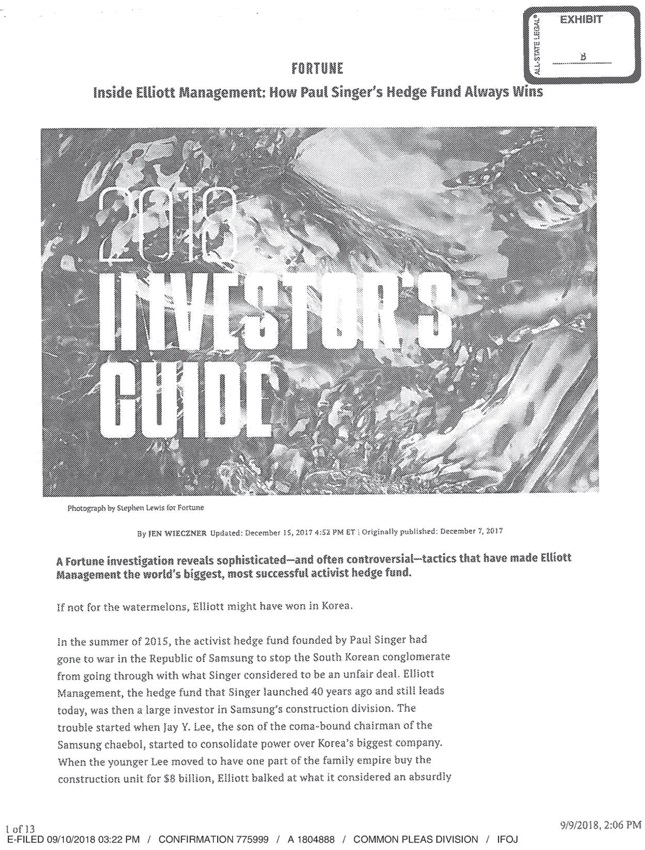
FORTUNE inside Elliott Management: How Paul Singer’s Hedge Fund Always Wins photograph by Stephen Lewis for Fortune By JEN WIECZNER Updated: December 15, 2O17 4:52 PM ET | Originally published: December 7, 2017 A Fortune investigation reveals sophisticated—and often controversial—tactics that have made Elliott Management the world’s biggest, most successful activist hedge fund. If not for the watermelons, Elliott might have won in Korea. In the summer of 2015, the activist hedge fund founded by Paul Singer had gone to war in the Republic of Samsung to stop the South Korean conglomerate from going through with what Singer considered to be an unfair deal. Elliott Management, the hedge fund that Singer launched 40 years ago and still leads today, was then a large investor in Samsung’s construction division. The trouble started when Jay Y. Lee, the son of the coma-bound chairman of the Samsung chaebol, started to consolidate power over Korea’s biggest company. When the younger Lee moved to have one part of the family empire buy the construction unit for $8 billion, Elliott balked at what it considered an absurdly
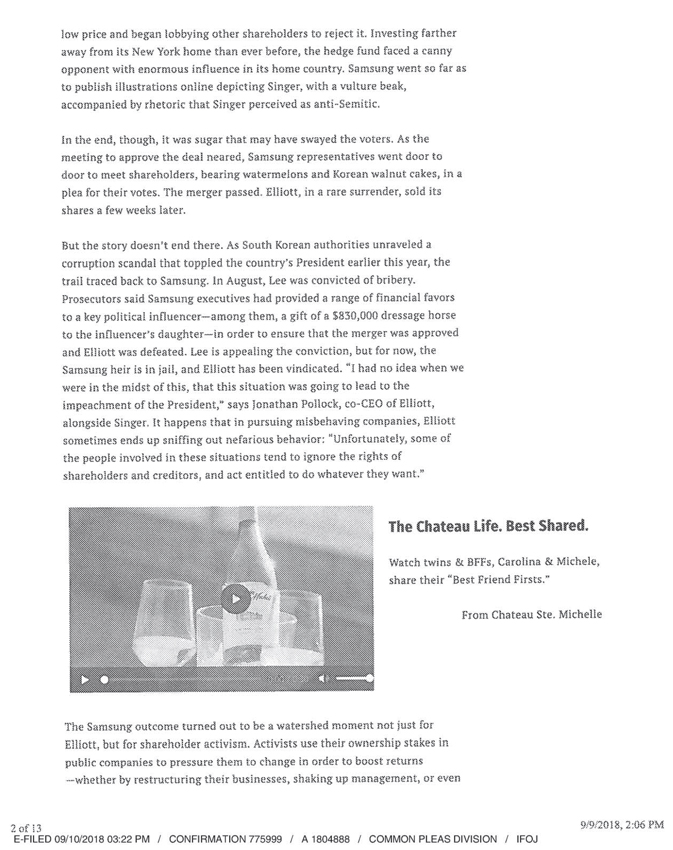
low price and began lobbying other shareholders to reject it. Investing farther away from its New York home than ever before, the hedge fund faced a canny opponent with enormous influence in its home country. Samsung went so far as to publish illustrations online depicting Singer, with a vulture beak, accompanied by rhetoric that Singer perceived as anti-Semitic. In the end, though, it was sugar that may have swayed the voters. As the meeting to approve the deal neared, Samsung representatives went door to door to meet shareholders, bearing watermelons and Korean walnut cakes, in a plea for their votes. The merger passed. Elliott, in a rare surrender, sold its shares a few weeks later. But the story doesn’t end there. As South Korean authorities unraveled a corruption scandal that toppled the country’s President earlier this year, the trail traced back to Samsung. In August, Lee was convicted of bribery. Prosecutors said Samsung executives had provided a range of financial favors to a key political influencer—among them, a gift of a $830,000 dressage horse to the influencer’s daughter—in order to ensure that the merger was approved and Elliott was defeated. Lee is appealing the conviction, but for now, the Samsung heir is in jail, and Elliott has been vindicated. I had no idea when we were in the midst of this, that this situation was going to lead to the impeachment of the President,”says Jonathan Pollock, co-CEO of Elliott, alongside Singer. It happens that in pursuing misbehaving companies, Elliott sometimes ends up sniffing out nefarious behavior: “Unfortunately, some of the people involved in these situations tend to ignore the rights of shareholders and creditors, and act entitled to do whatever they want. “The Chateau Life. Best Shared. Watch twins & BFFs, Carolina & Michele, share their “Best Friend Firsts.” From Chateau Ste. Michelle The Samsung outcome turned out to be a watershed moment not just for Elliott, but for shareholder activism. Activists use their ownership stakes in public companies to pressure them to change in order to boost returns—whether by restructuring their businesses, shaking up management, or even
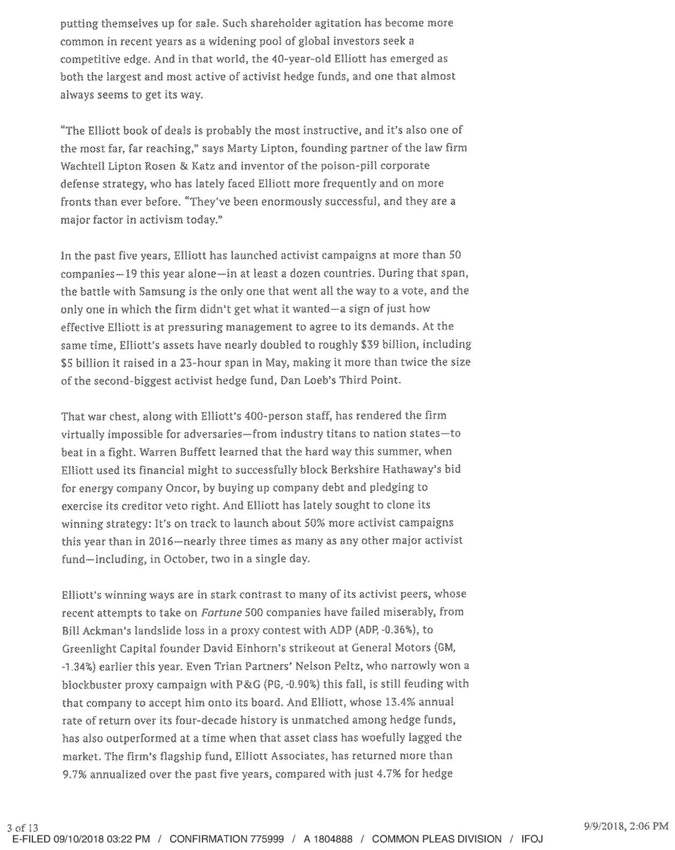
putting themselves up for sale. Such shareholder agitation has become more common in recent years as a widening pool of global investors seek a competitive edge. And in that world, the 40-year-old Elliott has emerged as both the largest and most active of activist hedge funds, and one that almost always seems to get its way. “The Elliott book of deals is probably the most instructive, and it’s also one of the most far, far reaching, “says Marty Lipton, founding partner of the law firm Wachtell Lipton Rosen & Katz and inventor of the poison-pill corporate defense strategy, who has lately faced Elliott more frequently and on more fronts than ever before. “They’ve been enormously successful, and they are a major factor in activism today. “In the past five years, Elliott has launched activist campaigns at more than 50 companies—19 this year alone—in at least a dozen countries. During that span, the battle with Samsung is the only one that went all the way to a vote, and the only one in which the firm didn’t get what it wanted—a sign of just how effective Elliott is at pressuring management to agree to its demands. At the same time, Elliott’s assets have nearly doubled to roughly $39 billion, including $5 billion it raised in a 23-hour span in May, making it more than twice the size of the second-biggest activist hedge fund, Dan Loeb’s Third Point. That war chest, along with Elliott’s 400-person staff, has rendered the firm virtually impossible for adversaries—from industry titans to nation states—to beat in a fight. Warren Buffett learned that the hard way this summer, when Elliott used its financial might to successfully block Berkshire Hathaway’s bid for energy company Oncor, by buying up company debt and pledging to exercise its creditor veto right. And Elliott has lately sought to clone its winning strategy: It’s on track to launch about 50% more activist campaigns this year than in 2016—nearly three times as many as any other major activist fund—including, in October, two in a single day. Elliott’s winning ways are in stark contrast to many of its activist peers, whose recent attempts to take on Fortune 500 companies have failed miserably, from Bill Ackman’s landslide loss in a proxy contest with ADP (ADP-0.36%), to Greenlight Capital founder David Einhorn’s strikeout at General Motors (GM, -1.34%) earlier this year. Even Trian Partners’ Nelson Peltz, who narrowly won a blockbuster proxy campaign with P&G (PG, -0.90%) this fall, is still feuding with that company to accept him onto its board. And Elliott, whose 13.4% annual rate of return over its four-decade history is unmatched among hedge funds, has also outperformed at a time when that asset class has woefully lagged the market. The firm’s flagship fund, Elliott Associates, has returned more than 9.7% annualized over the past five years, compared with just 4.7% for hedge funds overall.
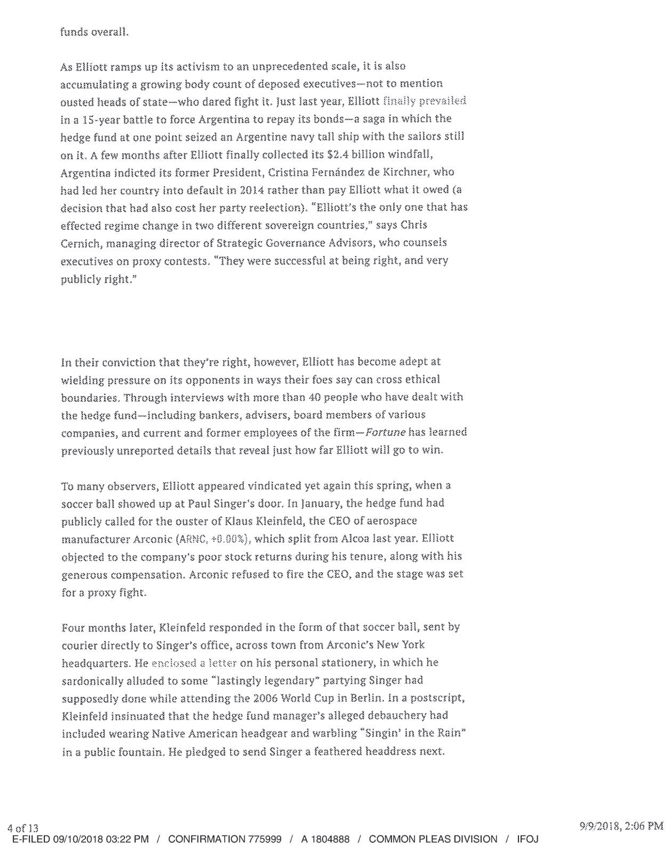
As Elliott ramps up its activism to an unprecedented scale, it is also accumulating a growing body count of deposed executives—not to mention ousted heads of statew—ho dared fight it. Just last year, Elliott finally prevailed in a l5-year battle to force Argentina to repay its bonds—a saga in which the hedge fund at one point seized an Argentine navy tail ship with the sailors still on it. A few months after Elliott finally collected its $2.4 billion windfall. Argentina indicted its former President, Cristina Fernandez de Kirchner, who had led her country into default in 2014 rather than pay Elliott what it owed (a decision that had also cost her party reelection). “Elliott’s the only one that has effected regime change in two different sovereign countries,” says Chris Cernich, managing director of Strategic Governance Advisors, who counsels executives on proxy contests, “They were successful at being right, and very publicly right,” In their conviction that they’re right, however, Elliott has become adept at wielding pressure on its opponents in ways their foes say can cross ethical boundaries. Through interviews with more than 40 people who have dealt with the hedge fund—including bankers, advisers, board members of various companies, and current and former employees of the firm—Fortune has learned previously unreported details that reveal just how far Elliott will go to win. To many observers, Elliott appeared vindicated yet again this spring, when a soccer hall showed up at Paul Singer’s door. In January, the hedge fund bad publicly called for the ouster of Klaus Kleinfeld, the CEO of aerospace manufacturer Arcontc (ARNC, +0,00%), which split from Alcoa last year. Elliott objected to the company’s poor stock returns during his tenure, along with his generous compensation. Arconic refused to fire the CEO, and the stage was set for a proxy fight. Four months later, Kleinfeld responded in the form of that soccer ball, sent by courier directly to Singer’s office, across town from Arconic’s New York headquarters. He enclosed a letter on his personal stationery, in which he sardonically alluded to some “lastingly legendary” partying Singer had supposedly done while attending the 2006 World Cup in Berlin, in a postscript, Kleinfeld insinuated that, the hedge fund manager’s alleged debauchery had included wearing Native American headgear and warbling “Singin’ in the Rain” in a public fountain. He pledged to send Singer a feathered headdress next.
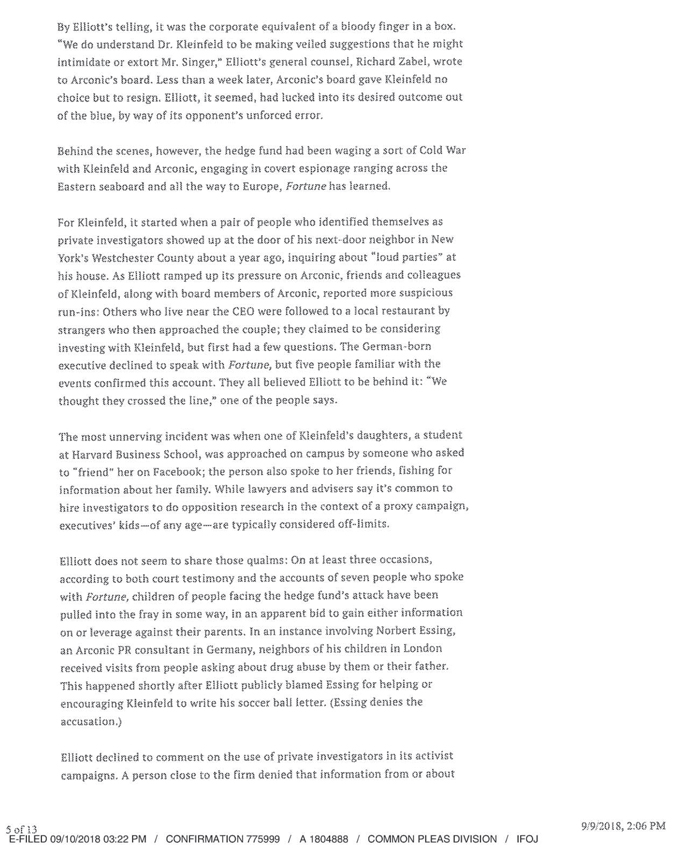
By Elliott’s telling, it was the corporate equivalent of a bloody finger in a box. “We do understand Dr. Kleinfeld to be making veiled suggestions that he might intimidate or extort Mr. Singer,” Elliott’s general counsel. Richard Zabel, wrote to Arconic’s board. Less than a week later. Arconic’s board gave Kleinfeld no choice but to resign. Elliott, it seemed, had lucked into its desired outcome out of the blue, by way of its opponent’s unforced error. Behind the scenes, however, the hedge fund had been waging a sort of Cold War with Kleinfeld and Arconic, engaging in covert espionage ranging across the Eastern seaboard and all the way to Europe, Fortune has learned. For Kleinfeld, it started when a pair of people who identified themselves as private investigators showed up at the door of his next- door neighbor in New York’s Westchester County about a year ago, inquiring about “loud parties” at his house. As Elliott ramped up its pressure on Arconic, friends and colleagues of Kleinfeld, along with board members of Arconic, reported more suspicious run-ins: Others who live near the CEO were followed to a local restaurant by strangers who then approached the couple; they claimed to be considering investing with Kleinfeld, but first had a few questions. The German-born executive declined to speak with Fortune, but five people familiar with the events confirmed this account. They all believed Elliott to he behind it: “We thought they crossed the line,” one of the people says. The most unnerving incident was when one of Kleinfeld’s daughters, a student at Harvard Business School, was approached on campus by someone who asked to “friend” her on Facebook; the person also spoke to her friends, fishing for information about her family. While lawyers and advisers say it’s common to hire investigators to do opposition research in the context of a proxy campaign, executives’ kids—of any age—rare typically considered off-limits. Elliott does not seem to share those qualms: On at least three occasions, according to both court testimony and the accounts of seven people who spoke with Fortune, children of people facing the hedge fund’s attack have been pulled into the fray in some way. in an apparent bid to gain either information on or leverage against their parents. In an instance involving Norbert Essing, an Arconic PR consultant in Germany, neighbors of his children in London received visits from people asking about drug abuse by them or their father. This happened shortly after Elliott publicly blamed Essing for helping or encouraging Kleinfeld to write his soccer ball letter. (Essing denies the accusation.) Elliott declined to commment on the use of private investigatiors in its activist compaigns. A person close to the firm denied that information from or about
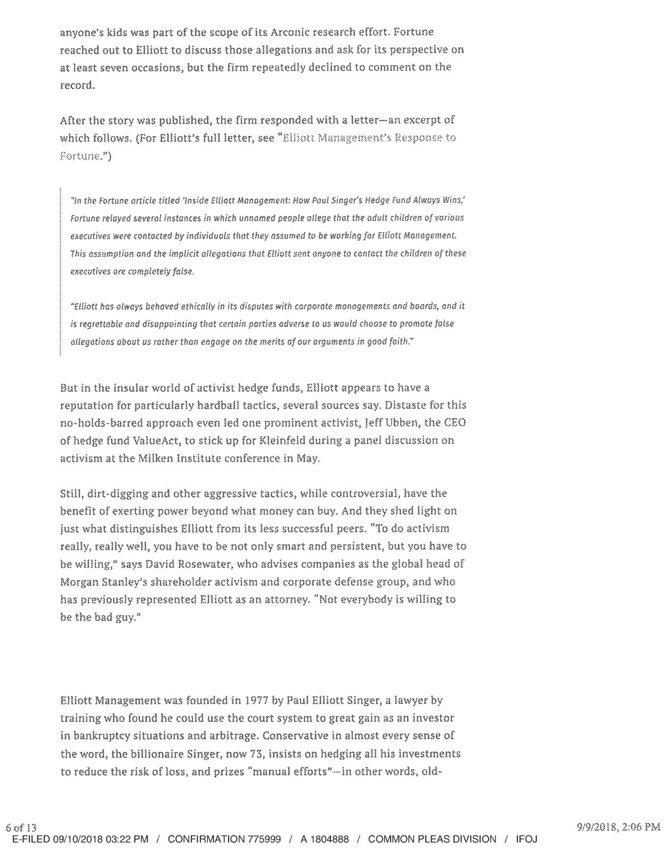
Elliott declined to comment on the use of private investigators in its activist campaigns. A person close to the firm denied that information from or about anyone’s kids was part of the scope of its Arconic research effort. Fortune reached out to Elliott to discuss those allegations and ask for its perspective on at least seven occasions, but the firm repeatedly declined to comment on the record. After the story was published, the firm responded with a letter—an excerpt of which follows. (For Elliott’s full letter, see “Elliott Management’s Response to Fortune.”) “in the Fortune article titled ‘Inside Elliott Management: How Paul Singer’s Hedge Fund Always Wins,’ Fortune relayed several instances in which unnamed people allege that the adult children of various executives were contacted by individuals that they assumed to be working for Elliot Management. This assumption and the implicit allegations that Elliott sent anyone to contact the children of these executives are completely false. “Elliott has always behaved ethically in its disputes with corporate managements and boards, and it is regrettable and disappointing that certain parties adverse to us would choose to promote false allegations about us rather than engage on the merits of our arguments in good faith.” But in the insular world of activist hedge funds, Elliott appears to have a reputation for particularly hardball tactics, several sources say. Distaste for this no-holds-barred approach even led one prominent activist, Jeff Ubben, the CEO of hedge fund ValueAct, to stick up for Kleinfeld during a panel discussion on activism at the Milken Institute conference in May. Still, dirt-digging and other aggressive tactics, while controversial, have the benefit of exerting power beyond what money can buy. And they shed light on just what distinguishes Elliott from its less successful peers. “To do activism really, really well, you have to be not only smart and persistent, but you have to be willing,” says David Rosewater, who advises companies as the global head of Morgan Stanley’s shareholder activism and corporate defense group, and who has previously represented Elliott as an attorney. “Not everybody is willing to be the bad guy.” Elliott Management was founded in 1977 by Paul Elliott Singer, a lawyer by training who found he could use the court system to great gain as an investor in bankruptcy situations and arbitrage. Conservative in almost every sense of the word, the billionaire Singer, now 73, insists on hedging all his investments to reduce the risk of loss, and prizes “manual efforts”—in other words, old-fashioned elbow grease—as the defining characteristic of his investment style.
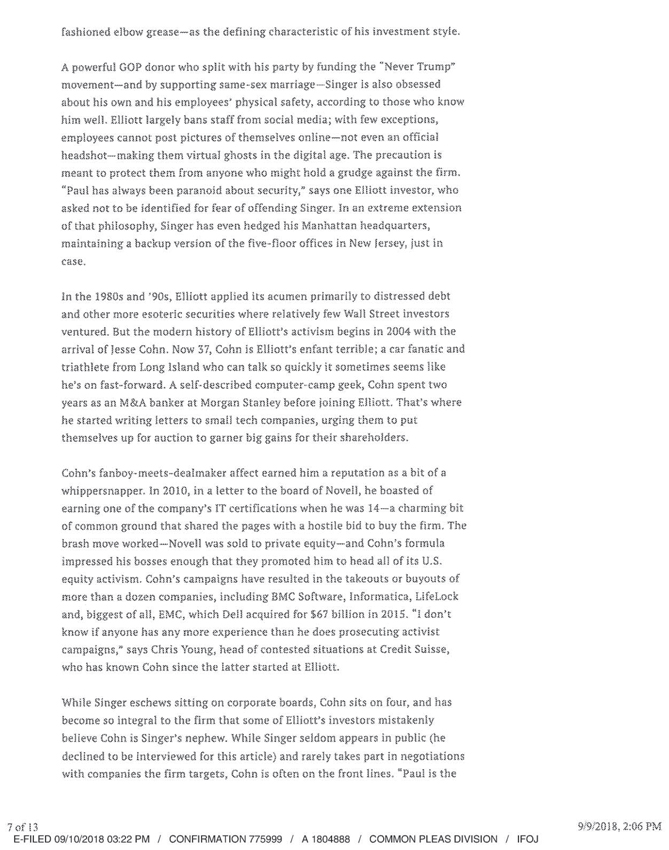
A powerful GOP donor who split with his party by funding the “Never Trump” movement—and by supporting same-sex marriage— Singer is also obsessed about his own and his employees’ physical safety, according to those who know him well. Elliott largely bans staff from social media; with few exceptions, employees cannot post pictures of themselves online—not even an official headshot—making them virtual ghosts in the digital age. The precaution is meant to protect them from anyone who might hold a grudge against the firm. “Paul has always been paranoid about security,” says one Elliott investor, who asked not to be identified for fear of offending Singer. In an extreme extension of that philosophy, Singer has even hedged his Manhattan headquarters, maintaining a backup version of the five-floor offices in New Jersey, just in case. In the 1980s and ‘90s, Elliott applied its acumen primarily to distressed debt and other more esoteric securities where relatively few Wall Street investors ventured. But the modern history of Elliott’s activism begins in 2004 with the arrival of Jesse Cohn. Now 37, Cohn is Elliott’s enfant terrible; a car fanatic and triathlete from Long Island who can talk so quickly It sometimes seems like he’s on fast-forward. A self-described computer-camp geek, Cohn spent two years as an M&A banker at Morgan Stanley before joining Elliott. That’s where he started writing letters to small tech companies, urging them to put themselves up for auction to garner big gains for their shareholders. Cohn’s fanboy-meets-dealmaker affect earned him a reputation as a hit of a whippersnapper. In 2010, in a letter to the board of Novell, he boasted of earning one of the company’s IT certifications when he was 14—a charming bit of common ground that shared the pages with a hostile bid to buy the firm. The brash move worked–Novell was sold to private equity–and Cohn’s formula impressed his bosses enough that they promoted him to head all of its U.S. equity activism. Cohn’s campaigns have resulted in the takeouts or buyouts of more than a dozen companies, including BMC Software, Informatica, LifeLock and, biggest of all, EMC, which Dell acquired for $67 billion in 2015. “I don’t know if anyone has any more experience than he does prosecuting activist campaigns,” says Chris Young, head of contested situations at Credit Suisse, who has known Cohn since the latter started at Elliott. While Singer eschews sitting on corporate boards, Cohn sits on four, and has become so integral to the firm that some of Elliott’s investors mistakenly believe Cohn is Singer’s nephew. While Singer seldom appears in public (he declined to be interviewed for this article) and rarely takes part in negotiations with companies the firm targets, Cohn is often on the front lines. “Paul is the
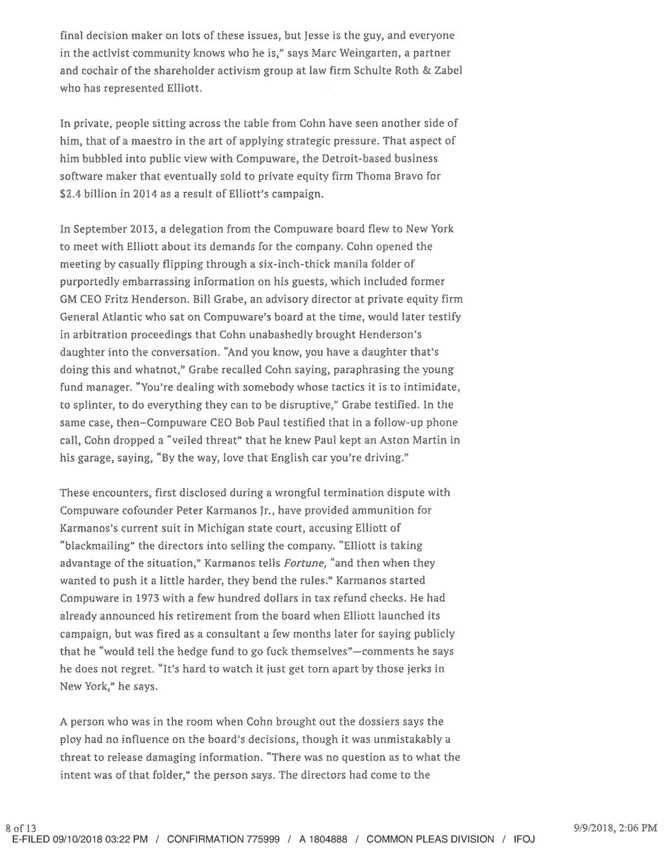
final decision maker on lots of these issues, but Jesse is the guy, and everyone in the activist community knows who he is,” says Marc Weingarten, a partner and cochair of the shareholder activism group at law firm Schulte Roth & Zabel who has represented Elliott, In private, people sitting across the table from Cohn have seen another side of him, that of a maestro in the art of applying strategic pressure. That aspect of him bubbled into public view with Compuware, the Detroit-based business software maker that eventually sold to private equity firm Thoma Bravo for $2.4 billion in 2014 as a result of Elliott’s campaign. In September 2013, a delegation from the Compuware board flew to New York to meet with Elliott about its demands for the company, Cohn opened the meeting by casually flipping through a six-inch-thick manila folder of purportedly embarrassing information on his guests, which included former GM CEO Fritz Henderson. Bill Grabe, an advisory director at private equity firm General Atlantic who sat on Compuware’s board at the time, would later testify in arbitration proceedings that Cohn unabashedly brought Henderson’s daughter into the conversation, “And you know, you have a daughter that’s doing this and whatnot,” Grabe recalled Cohn saying, paraphrasing the young fund manager, “You’re dealing with somebody whose tactics it is to intimidate, to splinter, to do everything they can to be disruptive,” Grabe testified. In the same case, then-Compuware CEO Bob Paul testified that in a follow-up phone call, Cohn dropped a “veiled threat” that he knew Paul kept an Aston Martin in his garage, saying, “By the way, love that English car you’re driving,” These encounters, first disclosed during a wrongful termination dispute with Compuware cofounder Peter Karmanos Jr., have provided ammunition for Karmanos’s current suit in Michigan state court, accusing Elliott of “blackmailing” the directors into selling the company. “Elliott is taking advantage of the situation,” Karmanos tells Fortune, “and then when they wanted to push if a little harder, they bend the rules.” Karmanos started Compuware in 1973 with a few hundred dollars in tax refund checks. He had already announced his retirement from the board when Elliott launched its campaign, but was fired as a consultant a few months later for saying publicly that he “would tell the hedge fund to go fuck themselves” —comments he says he does not regret. “It’s hard to watch it just get torn apart by those jerks in New York,” he says. A person who was in the room when Cohn brought out the dossiers says the ploy had no influence on the board’s decisions, though it was unmistakably a threat to release damaging information. “There was no question as to what the intent was of that folder,” the person says. The directors had come to the
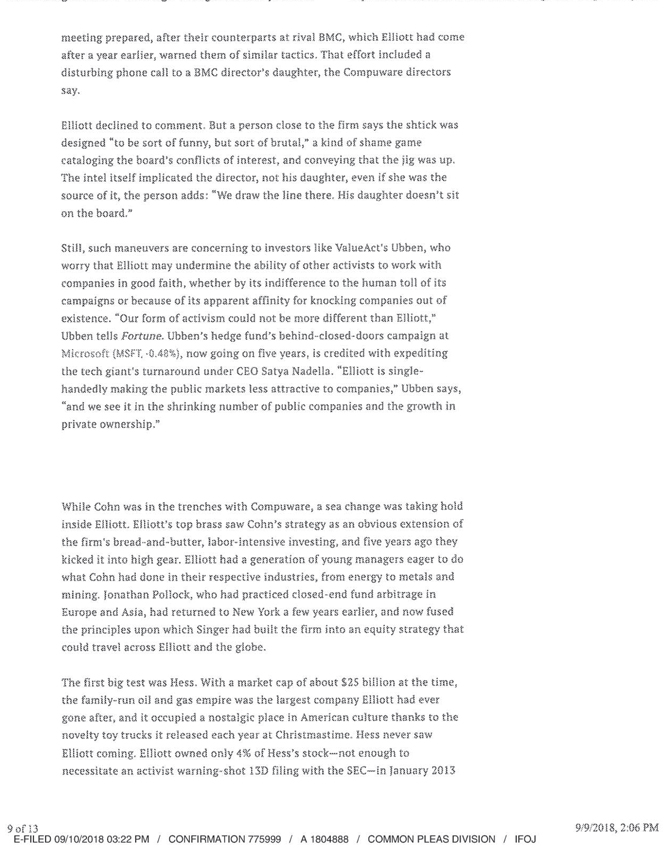
meeting prepared, after their counterparts at rival BMC, which Elliott had come after a year earlier, warned them of similar tactics. That effort included a disturbing phone call to a BMC director’s daughter, the Compuware directors say. Elliott declined to comment. But a person close to the firm says the shtick was designed “to be sort of funny, but sort of brutal,” a kind of shame game cataloging the board’s conflicts of interest, and conveying that the jig was up. The intel itself implicated the director, not his daughter, even if she was the source of it, the person adds: “We draw the line there. His daughter doesn’t sit on the board.” Still, such maneuvers are concerning to investors like ValueAct’s Ubben, who worry that Elliott may undermine the ability of other activists to work with companies in good faith, whether by its indifference to the human toll of its campaigns or because of its apparent affinity for knocking companies out of existence. “Our form of activism could not be more different than Elliott,” Ubben tells Fortune. Ubben’s hedge fund’s behind-closed-doors campaign at Microsoft (MSFT. -0.48%), now going on five years, is credited with expediting the tech giant’s turnaround under CEO Satya Nadella. “Elliott is single- handedly making the public markets less attractive to companies,” Ubben says, “and we see it in the shrinking number of public companies and the growth in private ownership.” While Cohn was in the trenches with Compuware, a sea change was taking hold inside Elliott. Elliott’s top brass saw Cohn’s strategy as an obvious extension of the firm’s bread-and -butter, labor-intensive investing, and five years ago they kicked it into high gear. Elliott had a generation of young managers eager to do what Cohn had done in their respective industries, from energy to metals and mining. Jonathan Pollock, who had practiced closed-end fund arbitrage in Europe and Asia, had returned to New York a few years earlier, and now fused the principles upon which Singer had built the firm into an equity strategy that could travel across Elliott and the globe. The first big test was Hess. With a market cap of about $25 billion at the time, the family- run oil and gas empire was the largest company Elliott had ever gone after, and it occupied a nostalgic place in American culture thanks to the novelty toy trucks it released each year at Christmastime. Hess never saw Elliott coming. Elliott owned only 4% of Hess’s stock—not enough to necessitate an activist warning-shot 13D filing with the SEC—in January 2013
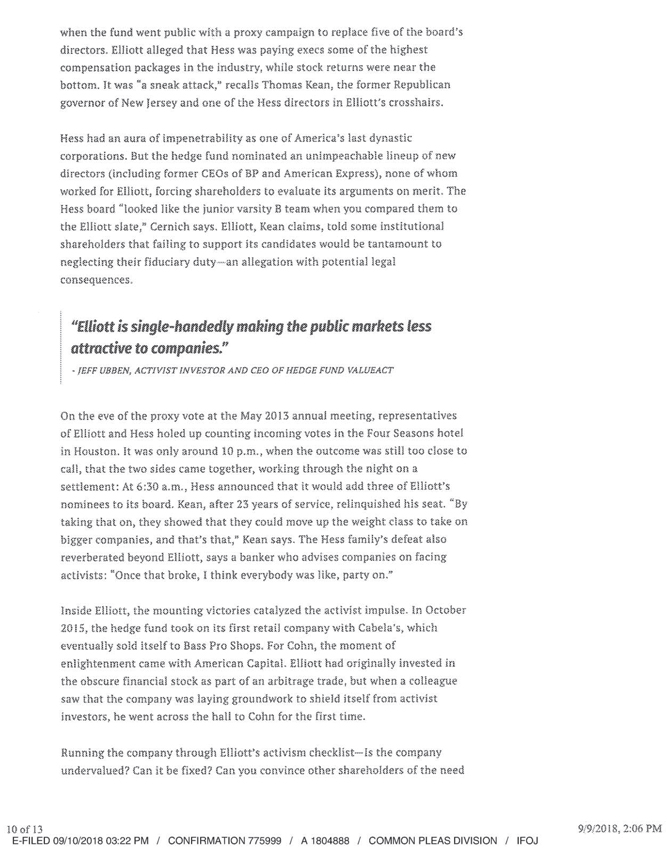
when the fund went public with a proxy campaign to replace five of the board’s directors. Elliott alleged that Hess was paying execs some of the highest compensation packages in the industry, while stock returns were near the bottom. It was “a sneak attack,” recalls Thomas Kean, the former Republican governor of New Jersey and one of the Hess directors in Elliott’s crosshairs. Hess had an aura of impenetrability as one of America’s last dynastic corporations. But the hedge fund nominated an unimpeachable lineup of new directors (including former CEOs of BP and American Express), none of whom worked for Elliott, forcing shareholders to evaluate its arguments on merit. The Hess board “looked like the junior varsity B team when you compared them to the Elliott slate,” Cernich says. Elliott, Kean claims, told some institutional shareholders that failing to support its candidates would be tantamount to neglecting their fiduciary duty—an allegation with potential legal consequences. “Elliott is single-handedly making the public markets less attractive to companies,”—JEFF UBBEN, ACTIVIST INVESTOR AND CEO OF HEDGE FUND VALUEACT On the eve of the proxy vote at the May 2013 annual meeting, representatives of Elliott and Hess holed up counting incoming votes in the Four Seasons hotel in Houston. It was only around 10 p.m., when the outcome was still too close to call, that the two sides came together, working through the night on a settlement: At 6:30 a.m., Hess announced that it would add three of Elliott’s nominees to its board. Kean, after 23 years of service, relinquished his seat. “By taking that on, they showed that they could move up the weight class to take on bigger companies, and that’s that,” Kean says. The Hess family’s defeat also reverberated beyond Elliott, says a banker who advises companies on facing activists: “Once that broke, I think everybody was like, party on.” Inside Elliott, the mounting victories catalyzed the activist impulse. In October 2015, the hedge fund took on its first retail company with Cabela’s, which eventually sold itself to Bass Pro Shops. For Cohn, the moment of enlightenment came with American Capital. Elliott had originally invested in the obscure financial stock as part of an arbitrage trade, but when a colleague saw that the company was laying groundwork to shield itself from activist investors, he went across the hall to Cohn for the first time. Running the company through Elliott’s activism checklist—is the company undervalued? Can it be fixed? Can you convince other shareholders of the need
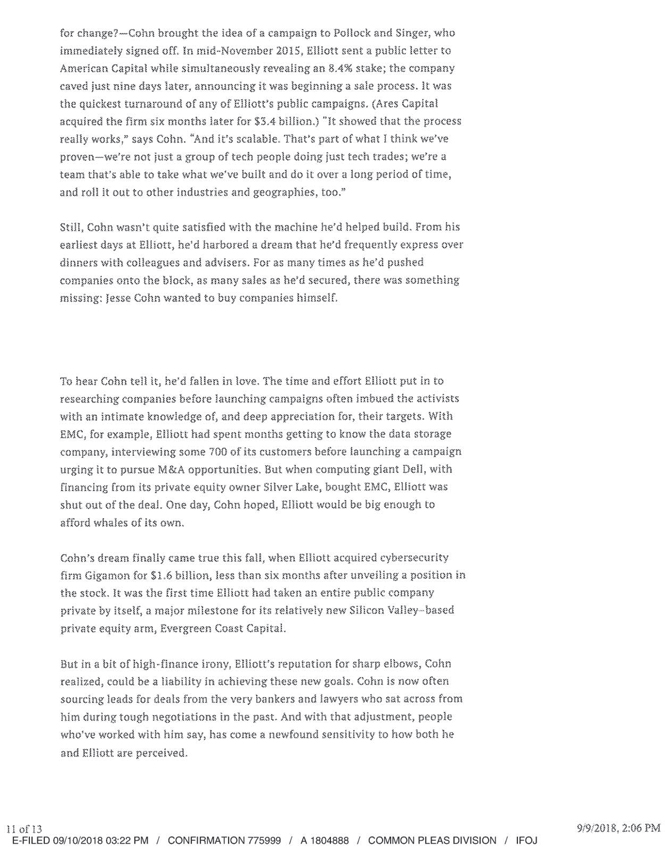
Running the company through Elliott’s activism checklist–Is the company undervalued? Can it be fixed? Can you convince other shareholders of the need for change?–Cohn brought the idea of a campaign to Pollock and Singer, who immediately signed off. In mid-November 2015, Elliott sent a public letter to American Capital while simultaneously revealing an 8.4% stake; the company caved just nine days later, announcing it was beginning a sale process. It was the quickest turnaround of any of Elliott’s public campaigns. (Ares Capital acquired the firm six months later for $3.4 billion.) “It showed that the process really works,” says Cohn. “And it’s scalable. That’s part of what I think we’ve proven–we’re not just a group of tech people doing just tech trades; we’re a team that’s able to take what we’ve built and do it over a long period of time, and roll it out to other industries and geographies, too.” Still, Cohn wasn’t quite satisfied with the machine he’d helped build. From his earliest days at Elliott, he’d harbored a dream that he’d frequently express over dinners with colleagues and advisers. For as many times as he’d pushed companies onto the block, as many sales as he’d secured, there was something missing: Jesse Cohn wanted to buy companies himself. To hear Cohn tell it. he’d fallen in love. The time and effort Elliott put in to researching companies before launching campaigns often imbued the activists with an intimate knowledge of, and deep appreciation for, their targets. With EMC, for example, Elliott had spent months getting to know the data storage company, interviewing some 700 of its customers before launching a campaign urging it to pursue M&A opportunities. But when computing giant Dell, with financing from its private equity owner Silver Lake, bought EMC, Elliott was shut out of the deal. One day, Cohn hoped, Elliott would be big enough to afford whales of its own. Cohn’s dream finally came true this fall, when Elliott acquired cybersecurity firm Gigamon for $1.6 billion, less than six months after unveiling a position in the stock. It was the first time Elliott had taken an entire public company private by itself, a major milestone for its relatively new Silicon Valley-based private equity arm, Evergreen Coast Capital. But in a bit of high-finance irony. Elliott’s reputation for sharp elbows, Cohn realised, could be a liability in achieving these new goals. Cohn is now often sourcing leads for deals from the very bankers and lawyers who sat across from him during tough negotiations in the past. And with that adjustment, people who’ve worked with him say, has come a newfound sensitivity to how both he and Elliott are perceived.
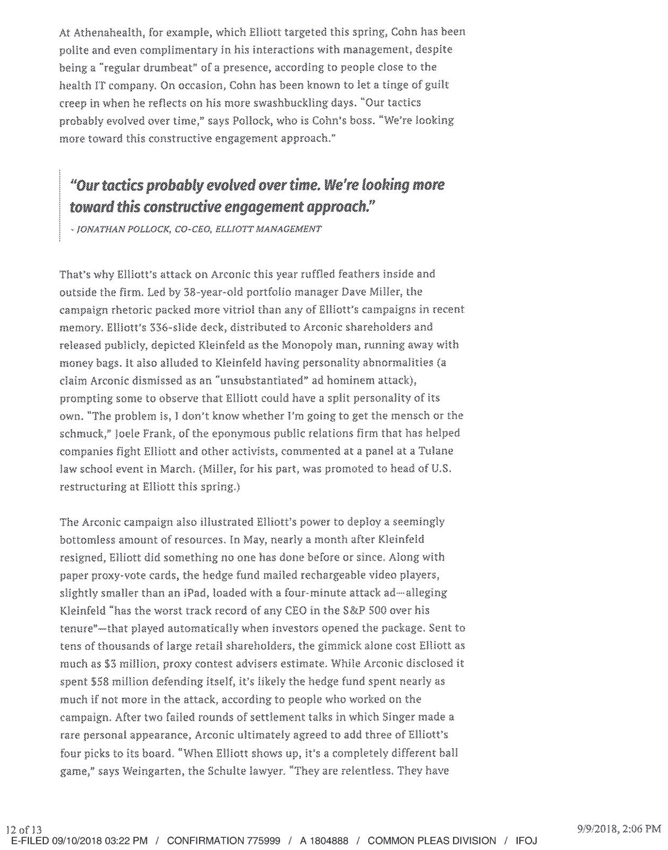
At Athenahealth, for example, which Elliott targeted this spring, Cohn has been polite and even complimentary in his interactions with management, despite being a “regular drumbeat” of a presence, according to people close to the health IT company. On occasion, Cohn has been known to let a tinge of guilt creep in when he reflects on his more swashbuckling days. “Our tactics probably evolved over time,” says Pollock, who is Cohn’s boss. “We’re looking more toward this constructive engagement approach.” “Our tactics probably evolved over time. We’re looking more toward this constructive engagement approach.” JONATHAN POLLOCK, CO-CEO, ELLIOTT MANAGEMENT That’s why Elliott’s attack on Arconic this year ruffled feathers inside and outside the firm. Led by 38-year-old portfolio manager Dave Miller, the campaign rhetoric packed more vitriol than any of Elliott’s campaigns in recent memory. Elliott’s 336-slide deck, distributed to Arconic shareholders and released publicly, depicted Kleinfeld as the Monopoly man, running away with money bags. It also alluded to Kleinfeld having personality abnormalities (a claim Arconic dismissed as an “unsubstantiated” ad hominem attack), prompting some to observe that Elliott could have a split personality of its own. “The problem is, I don’t know whether I’m going to get the mensch or the schmuck,” Joele Frank, of the eponymous public relations firm that has helped companies fight Elliott and other activists, commented at a panel at a Tulane law school event in March. (Miller, for his part, was promoted to head of U.S. restructuring at Elliott this spring.) The Arconic campaign also illustrated Elliott’s power to deploy a seemingly bottomless amount of resources. In May, nearly a month after Kleinfeld resigned, Elliott did something no one has done before or since. Along with paper proxy-vote cards, the hedge fund mailed rechargeable video players, slightly smaller than an iPad, loaded with a four-minute attack ad-alleging Kleinfeld “has the worst track record of any CEO in the S&P 500 over his tenure”–that played automatically when investors opened the package. Sent to tens of thousands of large retail shareholders, the gimmick alone cost Elliott as much as $3 million, proxy contest advisers estimate. While Arconic disclosed it spent $58 million defending itself, it’s likely the hedge fund spent nearly as much if not more in the attack, according to people who worked on the campaign. After two failed rounds of settlement talks in which Singer made a rare personal appearance, Arconic ultimately agreed to add three of Elliott’s four picks to its board. “When Elliott shows up, it’s a completely different ball game,” says Weingarten, the Schulte Sawyer. “They are relentless. They have the money, and they will spare no expense to ensure that they win.”
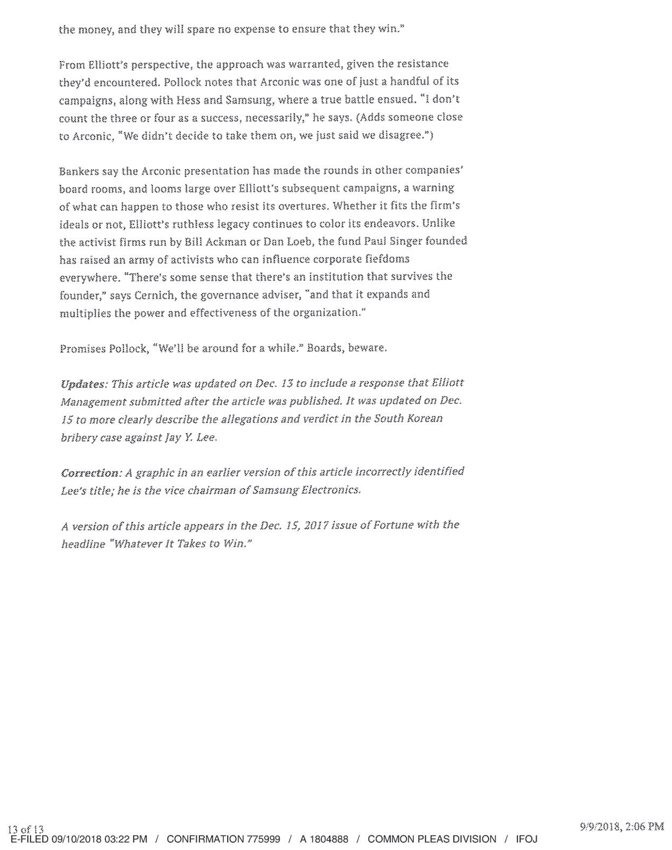
From Elliott’s perspective, the approach was warranted, given the resistance they’d encountered. Pollock notes that Arconic was one of just a handful of its campaigns, along with Hess and Samsung, where a true battle ensued. “I don’t count the three or four as a success, necessarily,” he says. (Adds someone close to Arconic, “We didn’t decide to take them on, we just said we disagree.”) Bankers say the Arconic presentation has made the rounds in other companies’ board rooms, and looms large over Elliott’s subsequent campaigns, a warning of what can happen to those who resist its overtures. Whether it fits the firm’s ideals or not, Elliott’s ruthless legacy continues to color its endeavors. Unlike the activist firms run by Bill Ackman or Dan Loeb, the fund Paul Singer founded has raised an army of activists who can influence corporate fiefdoms everywhere. “There’s some sense that there’s an institution that survives the founder,” says Cernich, the governance adviser, “and that it expands and multiplies the power and effectiveness of the organization.” Promises Pollock, “We’ll be around for a while.” Boards, beware. Updates: This article was updated on Dee. 13 to include a response that Elliott Management submitted after the article was published. It was updated on Dec. 15 to more clearly describe the allegations and verdict in the South Korean bribery case against Jay Y. Lee. Correction: A graphic in an earlier version of this article incorrectly identified Lee’s title; he is the vice chairman of Samsung Electronics. A version of this article appears in the Dec. 15, 2017 issue of Fortune with the headline “Whatever it Takes to Win.”
